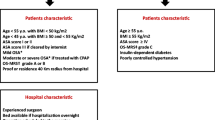Abstract
Background
Laparoscopic sleeve gastrectomy (LSG) is gaining acceptance among bariatric surgeons as a viable option for treating morbidly obese patients. We describe results of a single surgeon’s experience with LSG in a community practice revealing a low complication rate and describing the surgical technique.
Methods
LSG was performed in 529 consecutive patients from December 2006 to March 2010. A technique is described where all operations were performed with attention to avoiding strictures at the incisura angularis and stapling close to the esophagus at the angle of His. No operations performed used buttressing material or over-sewing of the staple line. A retrospective chart review and e-mail survey was conducted to determine the occurrence of complications and weight loss.
Results
Follow-up data was collected on 490 of the 529 (92.6%) patients at 6 weeks. A total complication rate of 3.2% and a 1.7% 30-day readmission rate were observed. No leaks occurred in any of the 529 patients, and one death (0.19%) was observed. The most common complications were nausea and vomiting with dehydration and venous thrombosis. The percentages of excess weight loss were 42.36, 65.92, 66.11, and 64.42 with a follow-up of 71%, 68%, 63%, and 49% at 6 months, 1 year, 2, and 3 years, respectively.
Conclusion
The LSG can be performed in a community practice with a low complication rate. Surgeons performing LSG should strive to minimize the risk of creating strictures at the incisura angularis and stapling near the esophagus at the angle of His.




Similar content being viewed by others
References
Buchwald H, Avidor Y, Braunnwald E, et al. Bariatric surgery: a systematic review and meta-analysis. JAMA. 2004;14:1724–37.
Lee CM, Cirangle PT, Jossart GH. Vertical gastrectomy for morbid obesity in 216 patients: report of two-year results. Surg Endosc. 2007;21:1810–6.
Regan JP, Inabet WB, Gagner M, et al. Early experience with two-staged laparoscopic Roux-en-Y gastric bypass as an alternative in the super-super obese. Obes Surg. 2003;13:861–4.
Frezza EE. Laparoscopic vertical sleeve gastrectomy for morbid obesity. The procedure of choice? Surg Today. 2007;37:275–81.
Dietel M, Crosby RD, Gagner M. The First International Consensus Summit for Sleeve Gastrectomy (SG), New York City, October 25–27, 2007. Obes Surg. 2008;18:487–96.
Tucker ON, Szomstein S, Rosenthal RJ. Indications for sleeve gastrectomy as a primary procedure for weight loss in the morbidly obese. J Gastrointest Surg. 2008;12:662–7.
Baltasar A, Serra C, Perez N, et al. Laparoscopic sleeve gastrectomy: a multi-purpose bariatric operation. Obes Surg. 2005;15:1124–8.
Brethauer SA, Hammel JP, Schauer PR. Systematic review of sleeve gastrectomy as staging and primary bariatric procedure. Surg Obes Relat Dis. 2009;5:469–75.
Weiner RA, Weiner S, Pomhoff I, et al. Laparoscopic sleeve gastrectomy-influence of sleeve size and resected gastric volume. Obes Surg. 2007;17:1297–305.
Parikh M, Gagner M, Heacock L, et al. Laparoscopic sleeve gastrectomy: does bougie size affect mean %EWL? Short-term outcomes. Surg Obes Relat Dis. 2008;4:528–33.
Gagner M, Deitel M, Kalberer TL, et al. The Second International Consensus Summit for Sleeve Gastrectomy, March 19–21, 2009. Surg Obes Relat Dis. 2009;5:476–85.
Langer FB, Bohdjalian A, Shakeri-Manesch S, et al. Eating behavior in laparoscopic sleeve gastrectomy: correlation between plasma ghrelin levels and hunger. Eur Surg. 2008;3:120–4.
Karamanakos SN, Vegenas K, Kalfarentzos F, et al. Weight loss, appetite suppression, and changes in fasting and postprandial ghrelin and peptide-YY levels after Roux-en-Y gastric bypass and sleeve gastrectomy; a prospective, double blind study. Ann Surg. 2008;247:401–7.
Nocca D, Krawczykowsky D, Bomans B, et al. A prospective multicenter study of 163 sleeve gastrectomies: results at 1 and 2 years. Obes Surg. 2008;18:560–5.
Lalor PF, Tucker ON, Szomstein S, et al. Complications after laparoscopic sleeve gastrectomy. Surg Obes Relat Dis. 2008;4:33–8.
Aggarwal S, Kini SU, Herron DM. Laparoscopic sleeve gastrectomy for morbid obesity: a review. Surg Obes Relat Dis. 2007;3:189–94.
Fuks D, Verhaeghe P, Brehaut O, et al. Results of laparoscopic sleeve gastrectomy: a prospective study in 135 patients with morbid obesity. Surgery. 2009;145:106–13.
Gagner M. Leaks after sleeve gastrectomy are associated with smaller bougies: prevention and treatment strategies. Surg Laparosc Endosc Percutan Tech. 2010;20:166–9.
Mery CM, Shafi BM, Binyamin G, et al. Profiling surgical staplers: effect of staple height, buttress, and overlap on staple line failure. Surg Obes Relat Dis. 2008;4:416–22.
Yehoshua RT, Eidelman LA, Stein M, et al. Laparoscopic sleve gastrectomy-volume and pressure assessment. Obes Surg. 2008;18:1083–8.
Conflict of Interest Disclosure
Dr. Bellanger receives teaching honoraria from Ethicon Endo-Surgery. Dr. Greenway is a consultant or board member for Basic Research, Dow Chemical, General Nutrition Corporation, GlaxoSmithKline, Jenny Craig, Leptos Biomedical, Lithera Inc., NuMe Health LLC, Obecure Ltd., Oncometa Pharmaceutical, Orexigen Therapeutics, Third Rock Ventures, and Schering-Plough. Dr. Greenway also receives honoraria from Carolinas Medical Center and has stock/stock options in Lithera, Oncometa Pharmaceuticals and PlenSat Inc.
Author information
Authors and Affiliations
Corresponding author
Rights and permissions
About this article
Cite this article
Bellanger, D.E., Greenway, F.L. Laparoscopic Sleeve Gastrectomy, 529 Cases Without a Leak: Short-Term Results and Technical Considerations. OBES SURG 21, 146–150 (2011). https://doi.org/10.1007/s11695-010-0320-y
Published:
Issue Date:
DOI: https://doi.org/10.1007/s11695-010-0320-y




